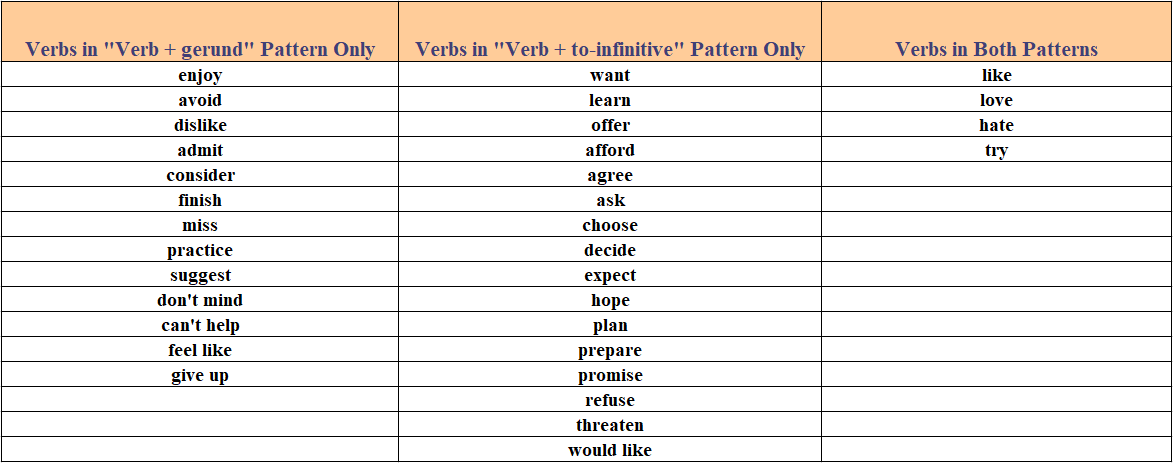Verb + Gerund VS Verb + To-infinitive
- Some verbs are always followed by a gerund (e.g., enjoy, consider).
- Some verbs are followed by a to-infinitive (e.g., plan, want).
- With some verbs, using a gerund or a to-infinitive can change the meaning of the sentence (e.g., like to do vs. like doing).
In English, verbs can be followed by another action. This action can be expressed in two main ways: using a gerund (-ing form) or a to-infinitive (to + base form of the verb).
Verbs Followed by a Gerund
Some verbs are always followed by a gerund. These verbs often express liking, disliking, or a similar feeling towards the action. Common verbs in this category include admit, avoid, consider, delay, deny, discuss, dislike, enjoy, and suggest.
Grammar Rule: Subject + verb + gerund (-ing form of a verb) (+ object)
Examples:
-
I enjoy reading.
Subject ("I") + verb ("enjoy") + gerund ("reading").
-
She considers traveling alone.
Subject ("She") + verb ("considers") + gerund ("traveling") + object ("alone").
Verbs Followed by a To-Infinitive
Other verbs are followed by a to-infinitive. These often express intention, decision, or desire. Examples of such verbs include ask, choose, expect, plan, promise, refuse, and want.
Grammar Rule: Subject + verb + gerund (-ing form of a verb) (+ object)
Examples:
-
We plan to visit Paris next year.
Subject ("We") + verb ("plan") + to-infinitive ("to visit") + object ("Paris next year").
-
He wants to learn Spanish.
Subject ("He") + verb ("wants") + to-infinitive ("to learn") + object ("Spanish").
Verbs That Can Be Followed by Either Gerund or To-Infinitive
With some verbs, both a gerund or a to-infinitive can follow, but the meaning of the sentence changes slightly. A common example is the verb "like."
Using a verb + gerund pattern suggests enjoyment of the activity itself.
Using a verb + to-infinitive suggests a preference for the idea of the activity (but you might not like the activity itself).

Examples:
-
I like to exercise in the morning.
I like the idea of exercising in the morning but maybe I don't enjoy the activity. I might like the idea because I want to lose weight or become healthier, but at the same time, I might hate running or pumping irons.
-
I like exercising in the morning.
I enjoy the activity itself. Exercising in the morning makes me feel good.
Practice this topic with the AI English Tutor
AI English Tutor will teach you the grammar and practice it with you in a conversation format. Plus, 100+ practice questions on this topic to cement your understanding.
Try ALULA for free on your phone or tablet








Do you have any questions about this lesson? Ask in the comment section, below.